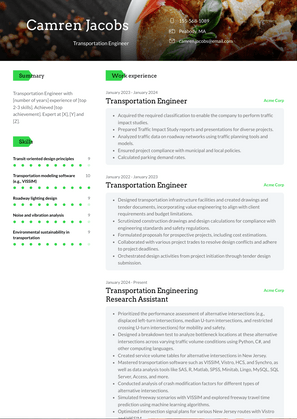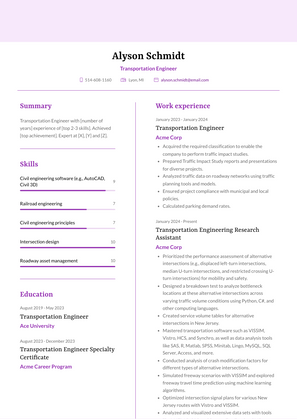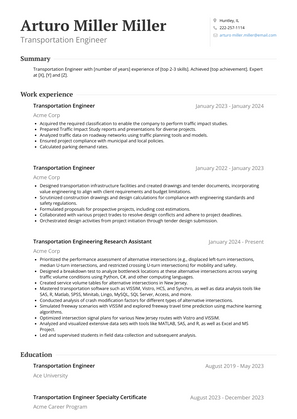Transportation Engineer Resume Examples and Templates
This page provides you with Transportation Engineer resume samples to use to create your own resume with our easy-to-use resume builder. Below you'll find our how-to section that will guide you through each section of a Transportation Engineer resume.



What do Hiring Managers look for in a Transportation Engineer Resume
- Technical Expertise: Strong knowledge of transportation engineering principles and relevant software/tools.
- Problem-Solving: Ability to analyze complex transportation issues and develop effective solutions.
- Regulatory Compliance: Ensure projects comply with local, state, and federal transportation regulations.
- Project Management: Skills to oversee and coordinate transportation projects from planning to completion.
- Communication: Effective communication skills for collaboration with teams and stakeholders.
How to Write a Transportation Engineer Resume?
To write a professional Transportation Engineer resume, follow these steps:
- Select the right Transportation Engineer resume template.
- Write a professional summary at the top explaining your Transportation Engineer’s experience and achievements.
- Follow the STAR method while writing your Transportation Engineer resume’s work experience. Show what you were responsible for and what you achieved as a Transportation Engineer.
- List your top Transportation Engineer skills in a separate skills section.
Advance your engineering career with a professionally crafted resume. Our engineering resume writing service showcases your technical expertise, project achievements, and problem-solving skills to help you secure top engineering roles.
How to Write Your Transportation Engineer Resume Header?
Write the perfect Transportation Engineer resume header by:
- Adding your full name at the top of the header.
- Add a photo to your resume if you are applying for jobs outside of the US. For applying to jobs within the US, avoid adding photo to your resume header.
- Add your current Transportation Engineering position to the header to show relevance.
- Add your current city, your phone number and a professional email address.
- Finally, add a link to your portfolio to the Transportation Engineer resume header. If there’s no portfolio link to add, consider adding a link to your LinkedIn profile instead.
Bad Transportation Engineer Resume Example - Header Section
Michaela 696 Rock Maple St. South Lyon, MI 48178 Marital Status: Married, email: cooldude2022@gmail.com
Good Transportation Engineer Resume Example - Header Section
Michaela Bean, Lyon, MI, Phone number: +1-555-555-5555, Link: linkedin/in/johndoe
Make sure to add a professional looking email address while writing your resume header. Let’s assume your name is John Doe - here is a formula you can use to create email addresses:
- firstnamelastname@email.com - johndoe@email.com
- firstname.lastname@email.com - john.doe@email.com
- lastname.firstname@email.com - doe.john@email.com
- f.lastname@email.com - j.doe@email.com
- l.firstname@email.com - d.john@email.com
- firstnamelastname12@email.com - johndoe12@email.com
For a Transportation Engineer email, we recommend you either go with a custom domain name (john@johndoe.com) or select a very reputed email provider (Gmail or Outlook).
How to Write a Professional Transportation Engineer Resume Summary?
Use this template to write the best Transportation Engineer resume summary: Transportation Engineer with [number of years] experience of [top 2-3 skills]. Achieved [top achievement]. Expert at [X], [Y] and [Z].
How to Write a Transportation Engineer Resume Experience Section?
Here’s how you can write a job winning Transportation Engineer resume experience section:
- Write your Transportation Engineer work experience in a reverse chronological order.
- Use bullets instead of paragraphs to explain your Transportation Engineer work experience.
- While describing your work experience focus on highlighting what you did and the impact you made (you can use numbers to describe your success as a Transportation Engineer).
- Use action verbs in your bullet points.
Transportation Engineering Research Assistant Resume Example
Transportation Engineering Research Assistant
- Prioritized the performance assessment of alternative intersections (e.g., displaced left-turn intersections, median U-turn intersections, and restricted crossing U-turn intersections) for mobility and safety.
- Designed a breakdown test to analyze bottleneck locations at these alternative intersections across varying traffic volume conditions using Python, C#, and other computing languages.
- Created service volume tables for alternative intersections in New Jersey.
- Mastered transportation software such as VISSIM, Vistro, HCS, and Synchro, as well as data analysis tools like SAS, R, Matlab, SPSS, Minitab, Lingo, MySQL, SQL Server, Access, and more.
- Conducted analysis of crash modification factors for different types of alternative intersections.
- Simulated freeway scenarios with VISSIM and explored freeway travel time prediction using machine learning algorithms.
- Optimized intersection signal plans for various New Jersey routes with Vistro and VISSIM.
- Analyzed and visualized extensive data sets with tools like MATLAB, SAS, and R, as well as Excel and MS Project.
- Led and supervised students in field data collection and subsequent analysis.
Transportation Engineer Resume Example
Transportation Engineer
- Acquired the required classification to enable the company to perform traffic impact studies.
- Prepared Traffic Impact Study reports and presentations for diverse projects.
- Analyzed traffic data on roadway networks using traffic planning tools and models.
- Ensured project compliance with municipal and local policies.
- Calculated parking demand rates.
Transportation Engineer Resume Example
Transportation Engineer
- Designed transportation infrastructure facilities and created drawings and tender documents, incorporating value engineering to align with client requirements and budget limitations.
- Scrutinized construction drawings and design calculations for compliance with engineering standards and safety regulations.
- Formulated proposals for prospective projects, including cost estimations.
- Collaborated with various project trades to resolve design conflicts and adhere to project deadlines.
- Orchestrated design activities from project initiation through tender design submission.
Top Transportation Engineer Resume Skills for 2023
- Traffic engineering analysis
- Roadway design and planning
- Transportation modeling software (e.g., VISSIM)
- Traffic signal and signage design
- Geographical Information Systems (GIS)
- Civil engineering principles
- Roadway construction and maintenance
- Public transportation planning
- Highway capacity analysis
- Environmental impact assessment
- Traffic flow optimization
- Road safety assessment
- Traffic impact studies
- Pavement design and analysis
- Intersection design
- Bridge and tunnel engineering
- Transportation demand management
- Transit-oriented development (TOD)
- Transportation network optimization
- Intelligent Transportation Systems (ITS)
- Traffic simulation modeling
- Parking management and design
- Land use planning and zoning
- Hydrology and drainage design
- Stormwater management
- ADA compliance for transportation
- Construction management
- Cost estimation and budgeting
- Roadway geometric design
- Civil engineering software (e.g., AutoCAD, Civil 3D)
- Traffic signal timing optimization
- Roadway asset management
- Environmental regulations and permits
- Bicycle and pedestrian infrastructure planning
- Public transit systems design
- Railroad engineering
- Transport infrastructure maintenance
- Geotechnical engineering
- Transportation planning software (e.g., TransCAD)
- Risk assessment and mitigation
- Project management for transportation projects
- Environmental sustainability in transportation
- Traffic impact mitigation strategies
- Noise and vibration analysis
- Transportation safety standards
- Freight and logistics planning
- Transit-oriented design principles
- GIS-based transportation analysis
- Roadway lighting design
- Public engagement and stakeholder communication
How Long Should my Transportation Engineer Resume be?
Your Transportation Engineer resume length should be less than one or two pages maximum. Unless you have more than 25 years of experience, any resume that’s more than two pages would appear to be too long and risk getting rejected.
On an average, for Transportation Engineer, we see most resumes have a length of 2. And, that’s why we advise you to keep the resume length appropriate to not get rejected.
How can I highlight my experience as a Transportation Engineer on my resume?
Focus on your expertise in designing, planning, and improving transportation systems. Highlight your role in managing transportation projects, conducting traffic analysis, and ensuring compliance with safety regulations and environmental standards.
What are the key skills to feature on a Transportation Engineer's resume?
Emphasize skills in traffic engineering, roadway design, project management, and transportation planning. Highlight your proficiency with design software like AutoCAD, Civil 3D, or Synchro, and your ability to develop solutions that improve transportation efficiency and safety.
How do I demonstrate my ability to manage transportation projects on my resume?
Provide examples of transportation projects you’ve led or contributed to, detailing the scope of work, project timelines, and your role in planning and design. Highlight your experience in coordinating with public agencies, contractors, and other stakeholders.
Should I include metrics on my Transportation Engineer resume? If so, what kind?
Yes, include metrics such as reductions in traffic congestion, improvements in travel times, or cost savings achieved through efficient project management. These metrics help quantify your contributions to transportation infrastructure improvements.
How can I showcase my experience with traffic analysis on my resume?
Detail your role in conducting traffic studies, analyzing traffic patterns, and using traffic simulation software. Highlight your ability to recommend improvements that enhance safety, reduce congestion, and optimize traffic flow.
What kind of achievements should I highlight as a Transportation Engineer?
Highlight achievements such as successfully completing transportation projects on time and within budget, improving road safety, or receiving recognition for innovative transportation designs. Mention any contributions to large-scale infrastructure projects or urban planning initiatives.
How do I address a lack of experience in a specific area of transportation engineering on my resume?
Emphasize your general engineering skills, analytical abilities, and problem-solving approach. Highlight any relevant coursework, certifications, or personal projects that demonstrate your adaptability and readiness to take on new transportation engineering challenges.
How important is collaboration for a Transportation Engineer role?
Collaboration is essential for ensuring that transportation projects meet design standards and stakeholder expectations. Highlight your experience in working with multidisciplinary teams, government agencies, and community members to deliver successful projects.
How do I demonstrate my ability to use engineering software on my resume?
Mention specific examples where you used tools like AutoCAD, Civil 3D, or traffic modeling software to design transportation systems, analyze traffic data, or create construction plans. Highlight your ability to deliver accurate, efficient, and compliant designs.
Should I include certifications on my Transportation Engineer resume?
Yes, include relevant certifications such as Professional Engineer (PE) license, Certified Transportation Planner (CTP), or certifications in traffic engineering. These demonstrate your expertise in transportation engineering and commitment to maintaining high professional standards.
-
What do Hiring Managers look for in a Transportation Engineer Resume
-
How to Write a Professional Transportation Engineer Resume Summary?
-
How to Write a Transportation Engineer Resume Experience Section?
-
Transportation Engineering Research Assistant Resume Example
-
How can I highlight my experience as a Transportation Engineer on my resume?
-
What are the key skills to feature on a Transportation Engineer's resume?
-
How do I demonstrate my ability to manage transportation projects on my resume?
-
Should I include metrics on my Transportation Engineer resume? If so, what kind?
-
How can I showcase my experience with traffic analysis on my resume?
-
What kind of achievements should I highlight as a Transportation Engineer?
-
How do I address a lack of experience in a specific area of transportation engineering on my resume?
-
How important is collaboration for a Transportation Engineer role?
-
How do I demonstrate my ability to use engineering software on my resume?
-
Should I include certifications on my Transportation Engineer resume?
Copyright ©2025 Workstory Inc.
